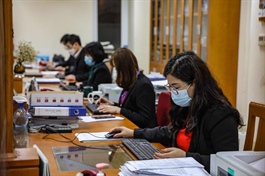Businesses lining up for IFRS conversion
Businesses lining up for IFRS conversion
Vietnamese businesses’ conversion and adoption of the International Financial Reporting Standards are among the most significant measures towards pushing for greater transparency, particularly for publicly traded entities, according to a number of senior executives.
In the first voluntary adoption year of the International Financial Reporting Standards (IFRS), a few publicly-listed businesses have already prepared parallel financial statements for both Vietnamese Accounting Standards (VAS) and IFRS. A pioneering example would be Century Corp.
Other companies, like Ho Chi Minh City Technical Infrastructure Investment JSC, plan to incorporate IFRS in this year’s financial statements. Large corporations like Vincom Retail JSC still publish quarterly investor relations bulletins updating their business results according to VAS and IFRS from last year to now.
By the end of 2021, TPBank will become one of the first Vietnamese financial institutions to adopt IFRS9 and Basel III.
“To assure liquidity and prepare a sound capital buffer to withstand market volatility, TPBank has decided to go forward and employ cutting-edge risk management techniques by implementing international practices such as IFRS,” said CEO Nguyen Hung.
Ngo Quang Trung, CEO of Viet Capital Bank, said that the bank was now testing 2021 databases and will continue testing 2022 databases. “We want to completely convert to IFRS by the beginning of 2023 and will continue to await state management’s fresh legal changes,” he said.
Nguyen Hong Van, director general of the Agency of Finance and Accounting under the State Bank of Vietnam, believed that many Vietnamese commercial banks might take advantage of IFRS9 to build a robust risk-finance platform that will aid in regulatory compliance and improve credit risk management.
“This would strengthen Vietnam’s already-robust financial system and better position the country’s banks to compete on the international stage. Furthermore, before granting any loan packages, local banks should also understand the IFRS-related statements of their corporate clients,” she said.
Van added that the most significant change for Vietnamese banks would be adopting the expected credit loss impairment model in IFRS9 when recognising loss allowances, which aims to promote earlier recognition of credit risk.
At the seminar last week on IFRS adoption for top listed companies organised by KPMG in Vietnam, experts agreed that following an international accounting standard was crucial to a solid financial sector and preparing Vietnamese companies for global competition.
According to Trinh Duc Vinh, deputy head of the Department of Accounting and Auditing Regulations under the Ministry of Finance, as the Vietnamese economy is now highly open, to facilitate deeper integration, the introduction of IFRS for public companies is inevitable.
“Accounting is no longer just a simple management tool. It has become a global business language. Companies with IFRS will be able to attract quality investors from abroad and access cheap capital sources,” Vinh noted.
“By way of issuing debt instruments or equity instruments to the international market, including issuing companies’ bonds or shares in foreign markets, tools like IFRS help to improve the transparency of financial statements, and are even contradictory with the market’s movement, to help investors more accurately assess the efficiency and financial position of the business.”
Nguyen Hoai Thu, managing director and head of investments at VinaCapital, assessed that the most appealing aspect of IFRS is that it increases comparability with other businesses in the same industry in other markets.
“Before making investment decisions in Vietnamese enterprises, foreign investors usually compare them with other companies in the same industry in Asia, based on certain standards,” Thu said.
“On a bigger scale, the application of IFRS will contribute to the attractiveness of Vietnam’s stock market and can even accelerate the upgrading process of the market. This is important to attracting foreign investors. In addition, when Vietnamese businesses are listed overseas, it’s obvious that IFRS will allow easier access to higher-quality foreign capital.”
Thu also said that the progress for applying IFRS would also be a criterion to evaluate the corporate governance quality of the businesses that VinaCapital invest in. “While VinaCapital greatly values corporate governance components, currently in frontier markets like Vietnam, the quality of corporate governance is still a huge difference between businesses. IFRS adoption would also be a good way to assess whether a business is well-managed,” Thu said.
On a broader scale, experts from World Bank in Vietnam stressed the significance of the sustainability report, as well as release of IFRS1 and IFRS2 by the International Sustainability Standards Board.
Deloitte Vietnam stated that the transition to IFRS creates not only technical accounting effects but also strategic values for businesses. “The Vietnamese conversion process does not involve such stable platform protocols, and in fact may feature the reverse - the incorporation of IFRS during the transition period, including updating content related to standards on insurance contracts, financial statement presentation, and business combinations, among others, which will create a platform with more fluctuations and challenges when Vietnamese enterprises perform the transition to IFRS,” the consultancy noted.




















